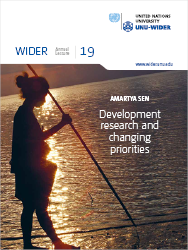WIDER Annual Lecture 19
Development research and changing priorities
In 2015 WIDER Annual Lecture 19 was given by Nobel laureate Amartya Sen. He discussed the overall challenge of sustainable and human-focused development including new and old challenges. Much progress has been made on the old issues of poverty and inequality, but there remains much to be done. On the occasion of UNU-WIDER’s 30th anniversary, Amartya Sen began his lecture by looking back at his role in the Institute’s founding.
It was a little over thirty years ago that Alex Kwapong, the former Vice Chancellor of the University of Ghana, and I were going from place to place and country to country to assess, along with a team from the United Nations University (UNU) (of which Kwapong was Vice-Rector), the suitability of the alternative locations that had been suggested for situating the new research institute that the UNU was about to establish. Helsinki emerged as an excellent choice, not just because Finland was offering generously to host the institute (there were excellent offers also from elsewhere, including the Netherlands), but also because Helsinki is such an attractive, elegant, and work-friendly place in which to base the institute. We talked with some Finnish academics, some government administrators, and a few ministers, listened to some great music, and walked in awe in Helsinki’s historic centre. At the end of it, when Alex and I sat down to chat about our decision, he said, ‘So, it is going to be Helsinki, right? Shall I draft a letter on behalf of both of us to the Rector?’ We were indeed in agreement, as was the team of UNU’s leading administrators who had come with Kwapong and me.
The new institute started functioning in Helsinki with remarkable speed. It was named the World Institute for Development Economics Research, which yields the functional acronym WIDER, pointing to the need for making development research wider – and more inclusive – than it had tended to be. Since I had a role in choosing the name, I was relieved that the pairing of the name and the acronym seemed to have stood the test of time, working in a reasonably informative way.
When UNU-WIDER was formally established, I could not for a while join it, because of a huge personal tragedy in my life. My wife, Eva Colorni, suddenly fell ill with cancer and after a short but valiant fight, she lost the battle. By the time, in a state of depression and dejection, I joined UNU-WIDER with two small children accompanying me (who instantly loved Helsinki), the institute was already beginning to work in top gear, under the insightful direction of Lal Jayawardena, the first Director of UNUWIDER. The high tempo of UNU-WIDER’s work, and its boundless optimism, helped me to get away from my personal tragedy and re-orient myself to join the battle against hunger and poverty in the world. Things were happening fast, and arrangements for new and innovative research moved rapidly ahead.
 Join the network
Join the network